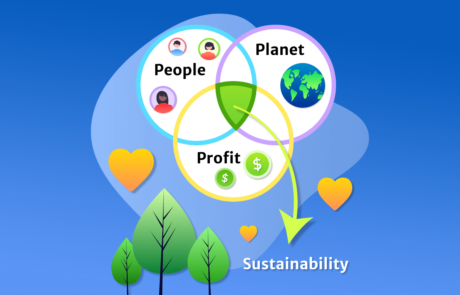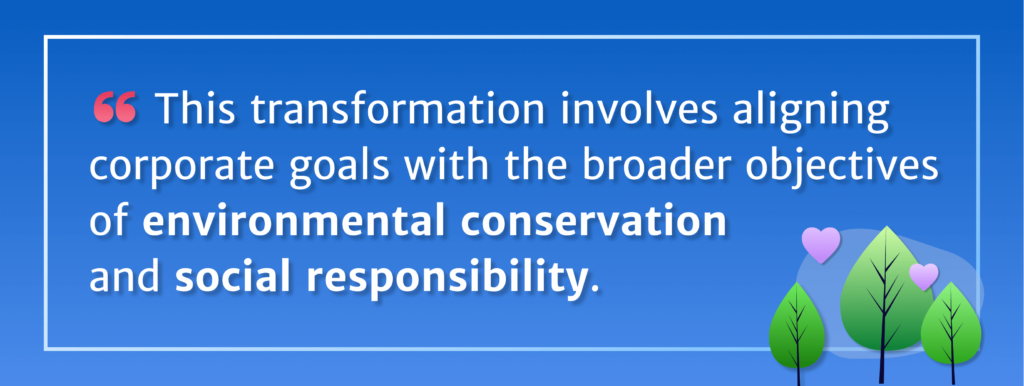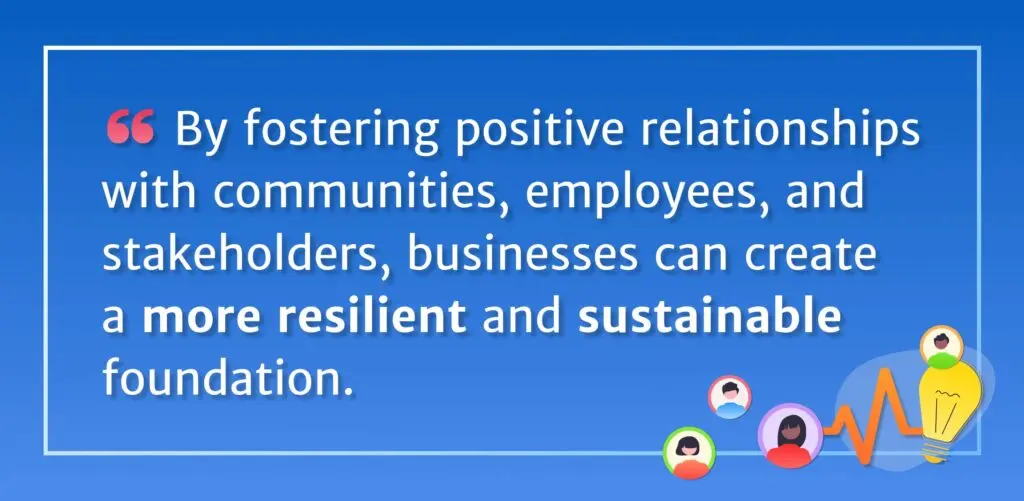Responsible Success: Achieving Sustainable Development in Business
Blog Categories:
Published:
February 18, 2024
Reading Time:
5 minutes

In the relentless pursuit of success, businesses are increasingly recognizing the need to harmonize economic growth with environmental and social responsibility. The concept of sustainable development has evolved from a mere buzzword to a strategic imperative for companies aiming to thrive in the long term.
In this inclusive guide, we will navigate through the waters of sustainable development, exploring actionable steps and best practices that businesses can adopt to align their strategies with the principles of Environmental, Social, and Governance (ESG).
In this inclusive guide, we will navigate through the waters of sustainable development, exploring actionable steps and best practices that businesses can adopt to align their strategies with the principles of Environmental, Social, and Governance (ESG).
Integrating Sustainability into Business Strategy
The journey towards sustainable development begins with a fundamental shift in mindset – from viewing sustainability as a mere compliance requirement to embracing it as a core element of the business strategy. This transformation involves aligning corporate goals with the broader objectives of environmental conservation and social responsibility.

Visionary Leadership and Cultural Shift: At the helm of this transformation stands visionary leadership. Sustainable development must be ingrained in the corporate culture, with leaders championing the cause from the top. This cultural shift towards sustainability involves fostering a sense of responsibility among employees, encouraging innovation, and integrating sustainability considerations into decision-making processes.
To effectively integrate sustainability into business strategy, companies can establish a dedicated sustainability team or appoint a Chief Sustainability Officer. This individual or team can drive the incorporation of sustainable practices throughout the organization, ensuring that every department is aligned with the overarching sustainability goals.
Setting Clear Objectives and Key Performance Indicators (KPIs): To measure progress effectively, businesses need to establish clear and measurable sustainability objectives and KPIs. These should align with the company's overall goals and provide a quantifiable framework for tracking performance. Setting realistic targets allows businesses to monitor their sustainability journey and make informed decisions based on data.
Moreover, incorporating sustainability into strategic planning involves considering the entire value chain. This includes evaluating suppliers, production processes, distribution channels, and product life cycles. By identifying opportunities for improvement and implementing sustainable practices at each stage, businesses can enhance their overall environmental and social impact.

Visionary Leadership and Cultural Shift: At the helm of this transformation stands visionary leadership. Sustainable development must be ingrained in the corporate culture, with leaders championing the cause from the top. This cultural shift towards sustainability involves fostering a sense of responsibility among employees, encouraging innovation, and integrating sustainability considerations into decision-making processes.
To effectively integrate sustainability into business strategy, companies can establish a dedicated sustainability team or appoint a Chief Sustainability Officer. This individual or team can drive the incorporation of sustainable practices throughout the organization, ensuring that every department is aligned with the overarching sustainability goals.
Setting Clear Objectives and Key Performance Indicators (KPIs): To measure progress effectively, businesses need to establish clear and measurable sustainability objectives and KPIs. These should align with the company's overall goals and provide a quantifiable framework for tracking performance. Setting realistic targets allows businesses to monitor their sustainability journey and make informed decisions based on data.
Moreover, incorporating sustainability into strategic planning involves considering the entire value chain. This includes evaluating suppliers, production processes, distribution channels, and product life cycles. By identifying opportunities for improvement and implementing sustainable practices at each stage, businesses can enhance their overall environmental and social impact.
KEY TAKEAWAYS
- Integration is Key: Sustainable development should be integrated into the core business strategy, driven by visionary leadership and a cultural shift toward sustainability. Establishing dedicated sustainability teams or appointing Chief Sustainability Officers can ensure that every department aligns with overarching sustainability goals.
Social Responsibility and Ethical Business Practices
Sustainable development goes beyond environmental considerations; it encompasses a commitment to social responsibility and ethical business practices. By fostering positive relationships with communities, employees, and stakeholders, businesses can create a more resilient and sustainable foundation.

Community Engagement and Stakeholder Collaboration: Successful integration of sustainability requires businesses to actively engage with the communities in which they operate. This involves understanding local needs, respecting cultural diversity, and implementing initiatives that contribute to the well-being of these communities. Collaborating with stakeholders, including local governments, NGOs, and community leaders, can enhance the effectiveness and credibility of sustainability efforts.
An exemplary model of community engagement is the incorporation of Corporate Social Responsibility (CSR) programs. These initiatives can focus on education, healthcare, environmental conservation, or other community-centric activities. By investing in the betterment of surrounding communities, businesses not only fulfill their social responsibility but also contribute to building a positive brand image.
Employee Welfare and Inclusivity: Employees are the backbone of any organization, and their well-being is integral to sustainable development. Businesses can prioritize employee welfare by adopting fair labor practices, providing a safe and inclusive work environment, and offering opportunities for professional development.
Diversity and inclusivity should also be embraced, recognizing the value of varied perspectives and experiences. By fostering a workplace culture that values equality and fairness, businesses not only enhance their social impact but also cultivate a more innovative and resilient workforce.

Adopting Environmental, Social, and Governance (ESG) Principles: ESG principles serve as a comprehensive framework for measuring and reporting sustainability performance. Environmental metrics consider a company's impact on the planet, including carbon footprint, energy consumption, and waste management. Social metrics evaluate the company's relationships with employees, communities, and other stakeholders. Governance metrics assess the organization's leadership, ethics, and transparency.
By incorporating ESG principles into their reporting frameworks, businesses can provide stakeholders with a holistic view of their sustainability efforts. This transparent approach enables investors, customers, and employees to make informed decisions based on the company's commitment to sustainable practices.
Implementing a Triple Bottom Line Approach: The Triple Bottom Line (TBL) approach emphasizes the simultaneous consideration of three key factors: economic, social, and environmental performance. This framework encourages businesses to evaluate success not only in terms of financial profitability but also in terms of its impact on people and the planet.
Measuring the triple bottom line involves conducting a comprehensive assessment of economic value, social responsibility, and environmental stewardship. By adopting this approach, businesses can gain insights into areas that require improvement, ultimately driving continuous progress toward sustainable development.
The journey towards sustainability is not a destination but a continuous process of improvement and adaptation. As businesses embark on this transformative journey, they not only contribute to a more sustainable future but also position themselves as leaders in an evolving global marketplace where environmental and social responsibility are integral to success. The Journey toward success requires not just a compass but a commitment to change and a vision for a better, more sustainable world.

Community Engagement and Stakeholder Collaboration: Successful integration of sustainability requires businesses to actively engage with the communities in which they operate. This involves understanding local needs, respecting cultural diversity, and implementing initiatives that contribute to the well-being of these communities. Collaborating with stakeholders, including local governments, NGOs, and community leaders, can enhance the effectiveness and credibility of sustainability efforts.
An exemplary model of community engagement is the incorporation of Corporate Social Responsibility (CSR) programs. These initiatives can focus on education, healthcare, environmental conservation, or other community-centric activities. By investing in the betterment of surrounding communities, businesses not only fulfill their social responsibility but also contribute to building a positive brand image.
Employee Welfare and Inclusivity: Employees are the backbone of any organization, and their well-being is integral to sustainable development. Businesses can prioritize employee welfare by adopting fair labor practices, providing a safe and inclusive work environment, and offering opportunities for professional development.
Diversity and inclusivity should also be embraced, recognizing the value of varied perspectives and experiences. By fostering a workplace culture that values equality and fairness, businesses not only enhance their social impact but also cultivate a more innovative and resilient workforce.
Measuring and Reporting Impacts
Accountability is a cornerstone of sustainable development. To demonstrate their commitment to environmental and social responsibility, businesses must implement robust systems for measuring and reporting their impact. Transparent reporting not only builds trust with stakeholders but also allows businesses to continually improve their sustainability performance.
Adopting Environmental, Social, and Governance (ESG) Principles: ESG principles serve as a comprehensive framework for measuring and reporting sustainability performance. Environmental metrics consider a company's impact on the planet, including carbon footprint, energy consumption, and waste management. Social metrics evaluate the company's relationships with employees, communities, and other stakeholders. Governance metrics assess the organization's leadership, ethics, and transparency.
By incorporating ESG principles into their reporting frameworks, businesses can provide stakeholders with a holistic view of their sustainability efforts. This transparent approach enables investors, customers, and employees to make informed decisions based on the company's commitment to sustainable practices.
Implementing a Triple Bottom Line Approach: The Triple Bottom Line (TBL) approach emphasizes the simultaneous consideration of three key factors: economic, social, and environmental performance. This framework encourages businesses to evaluate success not only in terms of financial profitability but also in terms of its impact on people and the planet.
Measuring the triple bottom line involves conducting a comprehensive assessment of economic value, social responsibility, and environmental stewardship. By adopting this approach, businesses can gain insights into areas that require improvement, ultimately driving continuous progress toward sustainable development.
The journey towards sustainability is not a destination but a continuous process of improvement and adaptation. As businesses embark on this transformative journey, they not only contribute to a more sustainable future but also position themselves as leaders in an evolving global marketplace where environmental and social responsibility are integral to success. The Journey toward success requires not just a compass but a commitment to change and a vision for a better, more sustainable world.
Unlocking Sustainable Success with Consultport's Expert Network
Consultport, a leading platform connecting businesses with experienced consultants, offers a tailored approach to help companies achieve their Sustainable Development Business goals. Leveraging a vast network of experts across various industries, Consultport facilitates the integration of sustainable practices into a company's core strategy.
Our network includes seasoned professionals specializing in sustainability, ESG principles, and ethical business practices. Through collaborative efforts, these experts work closely with organizations to instill a sustainability mindset at all levels, from leadership to operational teams. Consultport ensures that businesses not only meet compliance standards but also cultivate a culture of responsibility and innovation.
Furthermore, Consultport's experts guide companies in setting clear and measurable sustainability objectives, aligning them with the organization's overarching goals. By employing best practices and leveraging industry insights, our consultants enable businesses to navigate the complex landscape of sustainable development successfully.
So, contact Consultport to empower your businesses to embark on a transformative journey towards sustainable development, providing the expertise needed to navigate challenges, seize opportunities, and thrive in a socially and environmentally conscious business landscape.
Our network includes seasoned professionals specializing in sustainability, ESG principles, and ethical business practices. Through collaborative efforts, these experts work closely with organizations to instill a sustainability mindset at all levels, from leadership to operational teams. Consultport ensures that businesses not only meet compliance standards but also cultivate a culture of responsibility and innovation.
Furthermore, Consultport's experts guide companies in setting clear and measurable sustainability objectives, aligning them with the organization's overarching goals. By employing best practices and leveraging industry insights, our consultants enable businesses to navigate the complex landscape of sustainable development successfully.
So, contact Consultport to empower your businesses to embark on a transformative journey towards sustainable development, providing the expertise needed to navigate challenges, seize opportunities, and thrive in a socially and environmentally conscious business landscape.
Share This Story, Choose Your Platform!



